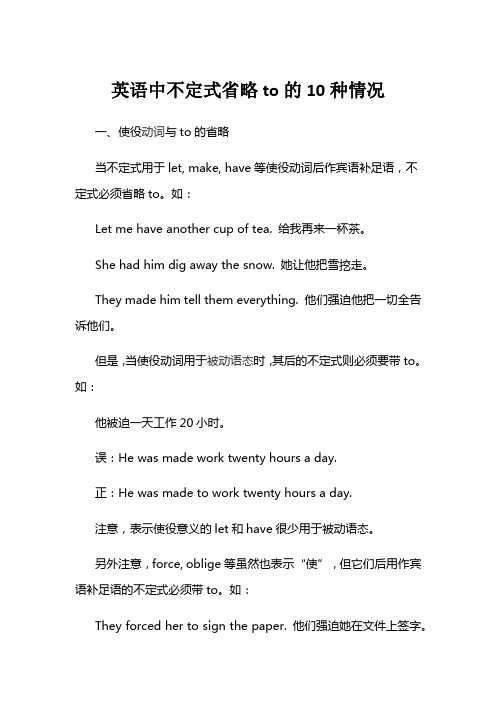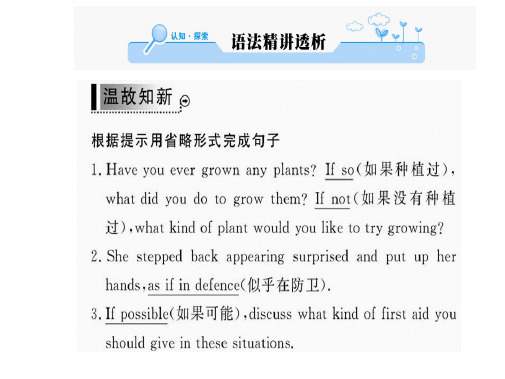不定式的省略
动词不定式省略to的9种情况

不定式省略 to 的九种情况一、使役动词后省略to 的情况在 let, make, have等使役动词后用作宾语补足语的不定式必须省略to 。
如:My mother wouldn’ t let me go to the film.我妈妈不会让我去看电影的。
I don ’t like milk, but mother made me drink it.我不喜欢牛奶,可是母亲强迫我喝。
I would have him wait for me at the gate of the park.我要他在公园门口等我。
注意: 1. 当使役动词用于被动语态时,要补上在主动语态中省略的 to( 主要是指 make ,let 和 have 很少用于被动语态 )。
2. force, oblige等虽然也表示 2. force, oblige “使”,但它们后用作宾语补足语的不定式必须带to 。
如: He forced me to go with them.他迫使我同他们一起去。
The police obliged him to leave.警方强迫他离开。
二、感觉动词后省略to 的情况在感觉动词后用作宾语补足语的不定式必须省略to 。
如:I watched her get into the car.我看着她上了车。
I saw the woman enter a bank.我看见这个女人进了一家银行。
We often hear her sing this song.我们经常听到她唱这首歌。
Did you notice her leave the house?她离开屋子你注意到了吗?注意:1. 这里所说的感觉动词主要包括see, hear, observe, notice, feel, watch等。
但是它们用于被动语态时,其后的不定式必须带to 。
如:The woman was seento enter a bank.有人看见这个女人进了一家银行。
不定式的省略

• 不定式的省略 1.为了避免重复,有时不定式中的主要动词可以省略, 只留下to • Would you like to come with su? --Yes, I’d love to. • You can go if you want to 2.用不定式作表语时,to 有时可以省略。 • All I did was (to) press the button. • One of the things I did was try drugs for the first time. 3. 在used to, be going to, ought to, try to, plan to 等结构后,当不定式省略时, to 通常是保留的。 • I weigh less than I used to.
4. 当有两Байду номын сангаас或更多不定式并列使用时,通常只在第一 个不定式前加to, 在后面的不定式前to常省略。 • 但如果二者有对比关系,每个不定式前都应带to. • We ought to read more and have more practice. • I’d like to stay with you, help you and learn from you. • To try and fail is better than not to try at all. • To go or not to go, is’t s question. 5. 如果承前省略的不定式内容是作助动词用的have/be 的任何形式,to后面要保留原形be/have/ have been。 • (1) He is not what he used to be • (2) -- Didn’t he tell you to attend the meeting? -- No, I ought to have been.
动词不定式的省略

为了避免重复,省略句子中的一个或几个成分,这种语法现象称为省略。
不定式的省略一般有三种常见形式:省略动词原形而保留符号to 、省略不定式符号to和省略整个带to不定式。
一、省略动词原形而保留符号to动词原形的省略是指前面出现过的动词在下文再次出现时,可以单纯使用不定式符号to即:只省去动词,而保留符号“to ”。
如:. Don’t stop unless you have to (stop ).You may bring the dictionary with you if you want to (bring it ).---Will you go with me ?---Well, I’d like to ( go with you ).---Have you ever been to the seaside ?---No, we can’t afford to ( go to the seaside).就不定式在句中的所起不同作用这一角度来看,在语言意义十分清楚和语境非常明确的情况下,动词原形在以下几种情况下省略:1.动词不定式在care, want, hope, wish , expect, prefer, refuse, mean, try , promise, like , love(尤其在would like, would love, want等之后)等动词后作宾语时,常常可以省略动词原形。
如:----Are you interested in going to university ?----Yes, I would like to( go to university ).2. 动词不定式在ask, warn, tell , advise, force, wish, expect, allow, permit 等动词后作宾语补足语或主语补足语时,常常可以省略动词原形。
如:Don’t touch anything unless your teacher tells you to( touch them ).As it is very hot, she wants to go swimming in the lake, but her mother doesn’t allow her to( go swimming ).3. 动词不定式在happy, glad, eager, anxious, willing, ready等形容词后作状语时,动词原形可以省略。
动词不定式省略to的9种情况

不定式省略to的九种情况一、使役动词后省略to的情况在let,make,have等使役动词后用作宾语补足语的不定式必须省略to。
如:Mymotherwouldn’tletmegotothefilm.我妈妈不会让我去看电影的。
Idon’tlikemilk,butmothermademedrinkit.我不喜欢牛奶,可是母亲强迫我喝。
Iwouldhavehimwaitformeatthegateofthepark.我要他在公园门口等我。
注意:1.当使役动词用于被动语态时,要补上在主动语态中省略的to(主要是指make,let和have很少用于被动语态)。
2.force,oblige等虽然也表示2.force,oblige“使”,但它们后用作宾语补足语的不定式必须带to。
如:Heforcedmetogowiththem.他迫使我同他们一起去。
Thepolice obligedhimtoleave.警方强迫他离开。
二、感觉动词后省略to的情况在感觉动词后用作宾语补足语的不定式必须省略to。
如:Iwatchedhergetinto thecar.我看着她上了车。
Isawthewomanenterabank.我看见这个女人进了一家银行。
Weoftenhearhersingthissong.我们经常听到她唱这首歌。
Didyounoticeherleavethehouse?她离开屋子你注意到了吗?注意:1.这里所说的感觉动词主要包括see,hear,observe,notice,feel,watch等。
但是它们用于被动语态时,其后的不定式必须带to。
如:Thewomanwasseen toenterabank.有人看见这个女人进了一家银行。
但是,用于以上句型的动词notice和watch和通常不用于被动语态。
2.类似地,动词lookat和listento 后用作宾语补足语的不定式也不带to。
如:Welistenedtotheoldmantellhissto r y .我们听这位老人讲述3.若动词feel 后用作宾语补足语的不定 式为t o b e ,t o (其他情to)。
不定式短语的省略

3. ---Do you mean to complete it within 3 days? ---Yes, I do mean to (complete it within 3 days). 4.---Have you decided to go abroad? ---Yes, I have decided to (go abroad).
2. 作宾语补足语的不定式短语
1.They should work hard, but you can’t force them to ( work hard). 2.---Did she go with you in the end? ---No, but I advised her to (go with me).
3.作主语补足语的不定式短语
1.---Did your husband give up smoking? ---No, he was advised to (give up smoking). 2.---Was our English teacher invited to attend our class-meeting? ---Yes, he was invited to (attend our class-meeting).
5.连接词+不定式短语
• 连接词+不定式短语 如果在句子中作宾语,宾语补足语或主语补 足语, 常常省略不定式短语及其符号, 而只保留连接词。
1. I want to improve my English, but I don’t know how (to improve my English).
2.---Did the teacher tell you when to leave ---No, she didn’t tell us when (to leave).
不定式的省略

四、介词except / but后省略to
(1)若except/but之前前出现了动词 do的各种 形式,其后的不定式通常省略 to;反之保留 to。 如: I had no choice but to wait. He wanted nothing but to stay there. It had no effect except to make him angry. She can do everything except cook. (2)在can’t but, can’t choose but, can’t help but等之后的不定式也要省略to。 When our country calls us for help, we I can’t but admire his courage. can't help but go.
(1).不定式中的动词上文已出现过,下文要省 略该动词,但保留to.
eg: Would you like to go with me ? I’d like to .(go with you.) 但是如果不定式的动词含有be/have/have been 动词,省略时保留be/have/have been。
六、并列不定式省略to
当两个或多个作用相同的不定式并列时,通常 只需在第一个不定式前用to,其余不定式前的 to可以省略。如: He told me to stay there and wait for him.
I’m really puzzled what to think or say.
七、省略不定式中的do
eg: Would you like to be a teacher? I’d like to be.
He is not the man he used to be.
英语中不定式省略to的10种情况

英语中不定式省略to的10种情况一、使役动词与to的省略当不定式用于let, make, have等使役动词后作宾语补足语,不定式必须省略to。
如:Let me have another cup of tea. 给我再来一杯茶。
She had him dig away the snow. 她让他把雪挖走。
They made him tell them everything. 他们强迫他把一切全告诉他们。
但是,当使役动词用于被动语态时,其后的不定式则必须要带to。
如:他被迫一天工作20小时。
误:He was made work twenty hours a day.正:He was made to work twenty hours a day.注意,表示使役意义的let和have很少用于被动语态。
另外注意,force, oblige等虽然也表示“使”,但它们后用作宾语补足语的不定式必须带to。
如:They forced her to sign the paper. 他们强迫她在文件上签字。
The law obliged parents to send their children to school. 法律要求父母送子女上学。
二、感觉动词与to的省略当不定式用于表示感觉的动词feel, hear, notice, observe, see, watch, look at, listen to等作宾语补足语时,不定式必须省略to。
如:We all felt the house shake. 我们都感觉这房子在震动。
I heard him go down the stairs. 我听见他下楼了。
Did you notice her leave the house? 她离开屋子你注意到了吗?I watched her get into the car. 我看着她上了车。
但是,当feel后用作宾语补足语的不定式为to be时,则不能省略to。
不定式的省略

D
---He hasn’t finished yet.
---Well,he ought to have.
1. -----Are you a sailor?
----- No, but I ____C___
A. am not B. used to C. used to be ed to being 2. -
2. 省to留do的用法。
I hope to finish my job and (to) go back home. 我希 望做完事回家。
What we could do was (to) get away. (主语从句 中含有do,那么作表语的动词不定式往往省略to)
There is nothing to do but (to) obey the orders. 除了服从命令之外,我们别无他法。(介词but 前如有do,but后可省略to)
To be or not to be, that is the question. 活着还 是死亡,这就是问题所在。(莎士比亚) It was better to laugh than to cry. 笑比哭好。
It was better to laugh than to cry. 笑比哭好。
当两个并列的不定式在意义上表示 对比关系时,后面的不定式一般不 省略to。
• 答:B。
---- Aren’t you the manager? ---- No, and I__B ____ • A. don’t want to B. don’t want to be • C. don’t want be D. don’t want
• —Are you a student?
time.
- 1、下载文档前请自行甄别文档内容的完整性,平台不提供额外的编辑、内容补充、找答案等附加服务。
- 2、"仅部分预览"的文档,不可在线预览部分如存在完整性等问题,可反馈申请退款(可完整预览的文档不适用该条件!)。
- 3、如文档侵犯您的权益,请联系客服反馈,我们会尽快为您处理(人工客服工作时间:9:00-18:30)。
He came home earlier than (he was) expected.
She works as hard as young people.
:省略在as if引导的方式状语从句中应用的较多.
• 由if等构成的此类省略形式 • if any 如果有的话 if ever 如果曾经的话 • if not如果没有的话 if so 如果这样的话 • if possible 如果可能的话 • if necessary 如果必要的话
• 1. if any 即使有(任何)……,如果 有……
• Correct errors, if any (=if there are any errors). 如有错误就请订正。
While (I was) walking along the street, I heard my name called. ④连词(when, if ,even if, unless, once, until, than, as)+过去分词 ⑤连词(as if, as though)+不定式
He opened his mouth as if (he were ) to speak.
1. Tom raised his hand as if (he was going) to say something. 2. He acted as if (he was) a fool. 3. She left the room hurriedly as if( she was) angry. 4. He stared at the girl as if (he was) seeing her for the first time. 5.The player stood still as if (he was ) turned to stone. 6. He opened the drawer as if (he was )in search of something important.
• A. used to B. used
• C. used to be D. used to was • 答:C。 • used to 也是不定式省略的一种形式,如
Do you often go there? No, but I used to. 但动词be一般不省。
• The boy wanted to ride his bicycle in the street, but his mother told him _________
不得不做 +do sth.(to一定要省)
I can not but admire his courage. 我不能不钦佩他的勇敢。
prefer to do sth rather than
would rather do than
+do sth.(to一定要省)
1. I’d rather _______ there alone. A. to go B. going C. go D. went 答:C。 would rather后接省去to的不定式。 2. He would rather die than ________. A. giving in B. give in C. to give in D. gave in 答:B。 would rather...than...表示“宁 愿……而不……”,后接省去to的不定式。
It was better to laugh than to cry. 笑比哭好。
当两个并列的不定式在意义 上表示对比关系时,后面的不 定式一般不省略to。
(作表语时可省可不省)
What we can do now is (to) wait.
can not but, can not choose but, can not help but
mind looking after my cat?
---Not at all. ________.
A. I've no time B. I'd rather not
C. I'd like it
D. I'd be happy to
D
---He hasn’t finished yet. ---Well,he ought to have.
当want 和like用于从句中时,to 也常省略。
•Come when you want. •I have decided to do what I like.
More practice
• —Have you got the book?
• —No, ________, but I didn’t get it.
1. --- You should have told her about it before you left.
--- I meant ________, but when I was leaving I couldn't
find her anywhere.
A. to do
B. to C. doing D. doing it B
(2)当从句主语是 It,谓语动词有含有系动词be时,可以把 it 系动词be一起省略。此时构成连词( if , unless, when,whenever)+形容词的结构。 Unless(it is )necessary,you‘d better not refer to the dictionary. (3)在than或as…as引导的从句中,常含有一些成分在上下 文清楚的情况下被省略。
2. The boy wanted to ride his bicycle in the street,
but his mother told him ________.
A. not to B. not to do C. not do it D. do not to A
3. --- I'll be away on a business trip. Would you
说明:but之前有实义动词do的某个形式do, does, did, done 时,不带to, 否则要带to。 (口诀:有do无to, 无do加to 或do but do)
We have nothing to do now but wait.我们现在除了等没有别的事可做。
He has no choice but to accept the fact.除了接受这个事实他别无选择。
• There are few people nowadays, if any, who remember him. 当今记得他的人,如 有的话,也不多了。
• 2. if ever (即使有……也)极少,难得
• He seldom if ever travels abroad. 他到国外 旅行,即使有过,也是极少的。
: as if用于省略句中,如果as if 引导的从句是“主语 +系动词”结构,可省略主语和系动词,这样as if 后就只 剩下不定式、名词、形容词(短语)、介词短语或分词。
• if类省略结构小结 • if从句省略“主语+be” • 若if从句的主语与主句主语一致,且if从句的主语后跟有
动词be,那么通常可以省略if从句的“主语+be”。
---- Aren’t you the manager? ---- No, and I__B____ • A. don’t want to B. don’t want to be • C. don’t want be D. don’t want
• —Are you a student?
• —No, but I________.
• A. I tried
B. I tried to
• C. I tried to get D. I tried it
• 答:B。to保留,其后的动词省略。
• —Would you like to go with us? • — _______, but I’m busy now. • A. I’d love B. I’d love to • C. I love D. I’d like • 答:B。
二. 状语从句的省略
(1)当状语从句的主语和主句的主语一致时,可以省略状语 从句中的主语和系动词be, 这时从句中可出现如下结构:
①连词(as, as if, once+名词)
Once (he was) a teacher, he now works in a government office. ②连词(though, whether, when)+形容词 Work hard when (you are) young ,or you’ll regret. ③连词(when, while, though)+现在分词
• A. not to B. not to do • C. not do it D. do not to • 答:A。to保留,to后的动词省略。
2. 省to留do的用法。
I hope to finish my job and (to) go back home. 我希望做完事回家。
What we could do was (to) get away. (主语 从句中含有do,那么作表语的动词不定式往往 省略to)
-----I_____B____, but I had an unexpected guest.
A. would like to B. would like to have
C.should
D.wouldn’t like to
如果不定式中含有be, have, have been通常保留 be,have和have been
